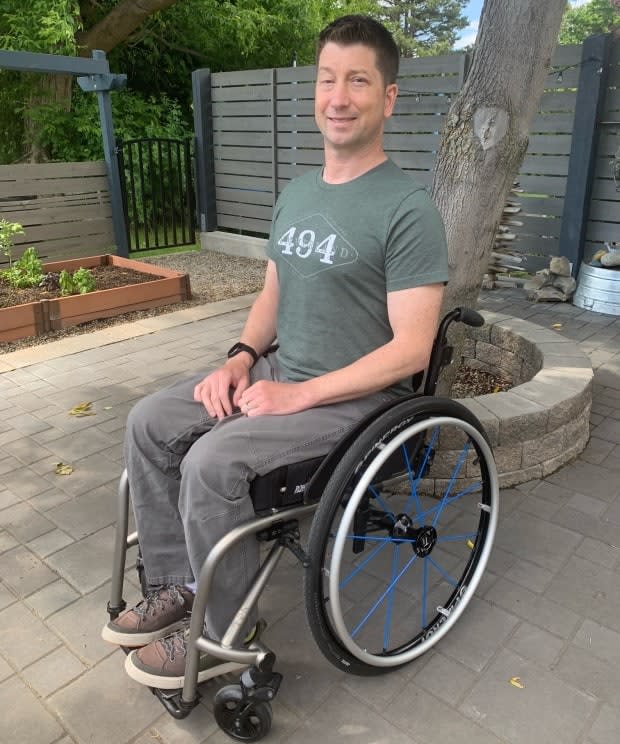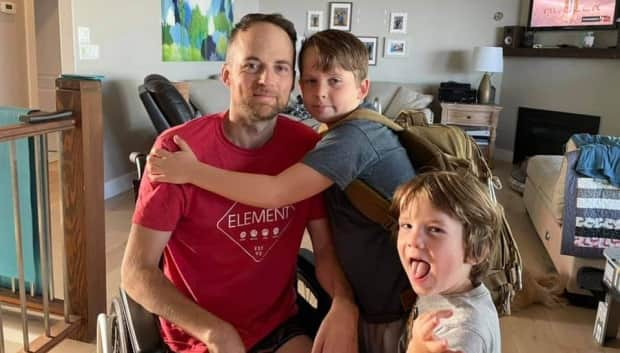$2.8 million paid out so far by Vaccine Injury Support Program

A program designed to compensate Canadians for vaccine injuries has paid out $2.779 million since it started accepting claims 19 months ago.
According to the Vaccine Injury Support Program (VISP) website, 50 of 1,299 claims submitted so far have been approved, with 18 rejected claims under appeal as of Dec. 1, 2022. Claims are approved when a medical review board determines a probable link between a recent Health Canada-authorized vaccine and "serious and permanent injury."
Lake Country, B.C.'s Ross Wightman was one of the first claimants approved by the VISP. The 41-year-old was hospitalized with Guillain-Barré Syndrome (GBS) — a rare and sometimes fatal condition that affects the nervous system — just days after his first and only dose of an Oxford-AstraZeneca COVID-19 vaccine.
"I'm told by the program that I'm the first person for everything related. So I'm the tip of the sword," he said.
The VISP covers Canadians who received a vaccine in Canada on or after Dec. 8, 2020, excluding those vaccinated in Quebec, where a provincial program exists.
More than 96 million doses of COVID-19 vaccine have been administered in Canada. Health experts note the risks associated with contracting COVID-19 far outweigh the risks of vaccination.
There have been more than 49,000 deaths associated with COVID-19 in Canada.
Claimants frustrated by delays
Without giving an exact figure, Wightman said he's received close to the maximum VISP payout possible of $284,000 for pain and suffering. That means his claim, which was approved in May 2021, accounts for close to 10 per cent of the total money distributed by the program so far.
A major frustration, said Wightman, is the length of time VISP takes to process a claim.
"I know lots of people in the community that I talked to are in a similar boat and are still having trouble," said Wightman. "Some are being rejected for various reasons, and others are just simply waiting for any sort of payment or communication from VISP about where their case is at."
According to the VISP website, "timelines for a determination of eligibility and support will depend on the nature and complexity of the claim."

Summerland, B.C.'s Julian Scholefield is also critical of the pace of VISP. The 45-year-old father of two relies on a wheelchair for mobility after he says he became paralyzed from the waist down, days after getting a second dose of the Pfizer-BioNTech COVID-19 vaccine in July 2021.
He filed a claim in October 2021 and has yet to receive notice of approval or denial.
"I was assigned a [VISP] caseworker in December of '21, and I sent in all my medical receipts and reviews .. the details they requested in January of '22. And since January of 2022, I've been following up on a pretty regular basis and you either get no response or a delayed response saying [to] just wait and see."
Scholefield hasn't been able to return to his job as senior manager at a winery. At the same time, expenses for things like adapting his home and vehicle so he can get around continue to add up.
"We're going into the hole every month," he said. "It's been extremely frustrating that I can't do anything about it. I'm caught here in a wheelchair in constant pain and not getting any sort of relief."
Scholefield said he's reached out to multiple levels of government for advice on how to expedite the process without any meaningful response.
"I either get absolutely no response from government or just essentially a form letter back saying thanks for your concern and good luck in the future."

Wightman was relieved his VISP claim was eventually accepted. But the money won't fix the reality of living with no sensation in his hands, feet and lower legs, not to mention the mental burden the vaccine injury has caused both him and his wife.
"Thirty per cent of people who have Guillain-Barré end up on life support," he said. "I'm going to require medical attention and [will have] expenses for the rest of my life."
CBC has contacted the Vaccine Injury Support Program but did not receive a reply by deadline.


